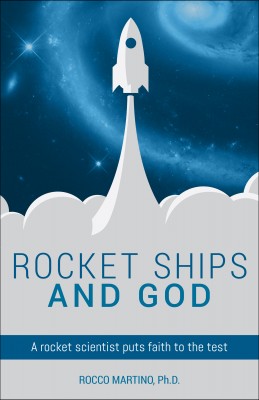Today we're featuring two excerpts from Dr. Rocco Martino's new book, Rocket Ships and God. The author, a Catholic rocket scientist, explores how to reconcile faith and science. --Barb
Rocket Ships and God by Dr. Rocco Martino
Published by Sophia Institute Press, 2015
Available in ebook format ($9.99) and paperback ($14.95) from Amazon.com.
Objectivity does not come easily to us. We can’t breathe in the truth or intuit it like the angels. So we need tools to gain knowledge—views of the truth from this or that angle. Plato described knowledge as something “justified through belief.” But the scientific side of our brains recognizes that if we want to get to the truth, we need objective facts, rather than facts as we would wish them to be.
The disciplines of science gather, filter, and codify some of the elements of the set of mankind’s total knowledge. Each discipline stakes out its own point of view and maintains its own body of facts, discoveries, and logical analyses it has accepted as valid and important. Each discipline also has its methods for seeking evidence, refining information, and discovering error—and its own hall of scientific heroes and villains.
How we acquire ideas depends on the unique traits of the people acquiring them: what they’re curious about, how they think, what they believe, what else they know, and what their personal obsessions and enthusiasms are. Before we can call people’s ideas “knowledge,” we need to cultivate the ideas objectively and determine whether they are true. Always, we must remind ourselves that scientists’ motivation for contributing raw ideas to the world is as subjective, varied, personal, emotional, artistic, partisan, ambitious, vindictive, noble, or holy as the individual scientists themselves.
-----
In science, the objective is to create and document laws of the behavior of matter that are reproducible by anyone, anywhere. Using mathematical descriptions strips away the mystery and the associations of words, allowing for complete understanding by anyone. Acceptance or rejection of a statement can be immediate.
This is not always possible in religion and theology. We often encounter situations in which reason cannot provide an answer. St. Anselm, a member of philosophy’s A-team—along with Augustine and Aquinas—described theology as fides quaerens intellectum—“faith seeking understanding.”
With faith in hand, it is vital to question and to define the situations where we have no answers. That is when the real work begins. There are only two possible reasons for not having answers: incomplete searches or incomplete knowledge.
In our Cyber Age, searches are relatively simple, and communication of results is easy. (Historically, this was not so.) But what about our knowledge? Is it too incomplete for us to make up our minds?
When you purchase Rocket Ships and God through any of the affiliate links in this post, you support the work we do at CatholicMom.com at no extra cost to you!
Excerpts from Rocket Ships and God used by permission of the publisher.
DR. ROCCO MARTINO received his Ph.D. from the Institute of Aerospace Studies in 1954 for his work on hazards from atmospheric heating in returning space vehicles, which contributed to the development of heat shields for spacecraft. He is an international financial consultant and computer specialist, and by training he is a rocket scientist.
About the Author

Guest
We welcome guest contributors who graciously volunteer their writing for our readers. Please support our guest writers by visiting their sites, purchasing their work, and leaving comments to thank them for sharing their gifts here on CatholicMom.com. To inquire about serving as a guest contributor, contact editor@CatholicMom.com.



.png?width=1806&height=731&name=CatholicMom_hcfm_logo1_pos_871c_2728c%20(002).png)
Comments